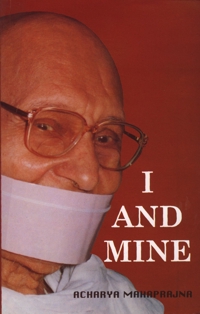
On the one hand we have people who swear by the practical aspect. They see no cause in relation to the purpose and no inner soul in relation to the external environment. On the other hand we have people who see everything from a realistic viewpoint. They believe that there is nothing beyond the cause and the inner soul. Purpose and environment have no usefulness. Both viewpoints represent extreme ends of the truth. They are not mutually blended and, therefore, represent fragmented truth. The perfect truth is that every cause existing within the 'influence-zone' of the target or purpose is affected by the latter, while any causes existing outside that zone is not affected by purpose. The former is an accidental state while the latter is natural. Those given to one-sided exposition superimpose the natural state on the accidental one. To attain the natural state is our end but at present we have no means to attain it. At present, we are in the accidental state. After attaining the natural state we are not affected by the purpose. But it is an imposed and not a real belief that we are not influenced by the purpose while we are in the accidental state.
Man has a good deal of reactive tendency. For the ordinary man it is not easy to grasp the subtle; therefore, he is more insistent on the gross or the physical. A progressive person (in the spiritual sense) does not find much substance in the physical; therefore, he is insistent on the subtle. In an age overwhelmingly given to worshipping the subtle, men start getting inclined towards the physical. Likewise, when there is overwhelming worship of the physical, people start getting inclined towards the subtle. Both these tendencies are reactive characteristics of one-sided behaviour. The way out is a balance view of the gross and the subtle. The end is subtler, more long term and more difficult than the means. From the grossest to the grosser and from the grosser to the gross marks a forward journey from where we take a new turn towards the realm of the subtle.
One who worships fire cannot experience coolness because coolness and heat are mutually contrary qualities. Then how can a worshipper of darkness obtain light? Our soul in its pure form is characterized by stillness. That is our goal. Activeness is the opposite of inactiveness. Then how can we progress towards inactiveness (stillness) through activeness? The two would become distinguishable if activeness were to be the means of attaining stillness.
It is difficult to ridicule the above method of questioning. I have no argument to support the proposition that one can obtain light through darkness. But I am also not prepared to accept that there exists extreme opposition (contradictoriness) between activeness and stillness. Inactiveness is different from activeness but is not the absence of activeness. One who exists cannot be inactive and one who is inactive cannot exist. Existence and inactiveness are mutually contradictory. The characteristic of Truth is activeness. Truth cannot be explained without activeness. The soul when liberated does not become inactive; it remains active. It is regarded inactive because it has been freed from certain activities. The liberated soul becomes active because it has freed itself from eating, but it remains constantly active because of the unceasing cognitive activity. It is deprived of the joy of drinking water as a result of the absence of thirst, but it is never deprived of spontaneous spiritual joy.
Our existence is given to activeness and will remain active under all circumstances. Activeness is our spontaneous nature. It will never change. Change can occur only in activities. When one activity ceases and another begins, in the light of the subsequent change we disregard the earlier activity and call that state inactiveness. With such extensive understanding of activity we arrive at the truth that activeness is the cause not only of bondage but also of liberation. It is not only darkness but also light. We can sum up the foregoing discourse by saying that a particular kind of liberated state can be accomplished by a particular kind of activeness. This principle is not of achieving inactiveness through inactiveness but of achieving a specific type of activeness through a particular type of activeness. According to this, principle activity is not altogether forbidden, but a specific type of activity is prohibited. Activity likely to defeat the goal is prohibited, while activity likely to promote the goal is accepted. Pure actions cannot be held to be opposed to spiritual purity. That is why activeness in our world is not to be altogether avoided. On the attainment of subtle activeness, gross activeness automatically ceases. But any effort to relinquish gross activeness before accomplishing subtle activeness can be suicidal.
 Acharya Mahaprajna
Acharya Mahaprajna

